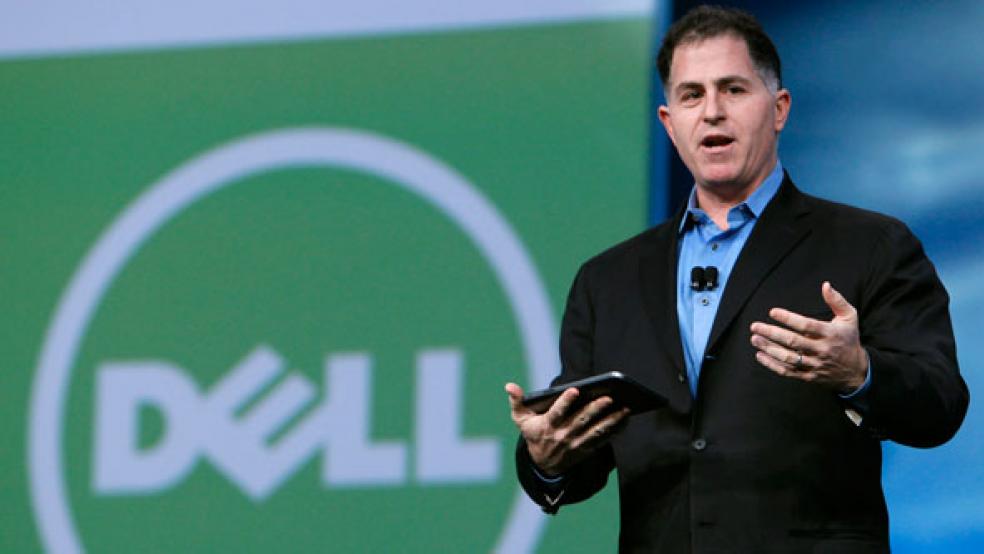Computer maker Dell Inc said on Monday it had agreed to buy data storage company EMC Corp in a $67 billion record technology deal that will unite two mature companies and create an enterprise technology powerhouse.
The acquisition will help privately held Dell diversify from a stagnant personal-computer market and give it greater scale in the more profitable and faster-growing market for managing and storing data.
Related: Charter and Time Warner Cable Merger: It’s All About Broadband
Combining Dell's server businesses with EMC's storage and virtualization assets, the merged company will have a broader product offering with which to challenge IBM Corp, Cisco Systems Inc and Hewlett-Packard Co in the areas of cloud computing, mobility and cyber security.
"I don’t think either Dell or EMC were viable over the long run as a standalone; they really needed each other," said Eric Johnson, dean of the Owen School of Management at Vanderbilt University. "Dell was mostly on the consumer side, which is a terrible place to be. EMC had some enterprise products, but not the complete package."
The deal valued EMC at $33.15 a share as of the end of trading Friday. Dell will pay $24.05 per share in cash and will also give EMC shareholders a special stock that tracks the share price in VMWare Inc, the virtual software provider majority-owned by EMC.
EMC shares rose 1 percent to $28.15 after earlier jumping more than 2.5 percent. VMware shares plunged nearly 10 percent to $70.96, decreasing the value of Dell's offer.
Related: Will Health Insurer Mega-Mergers Cost You More?
VMware will remain an independent, publicly traded company.
EMC's board has approved the merger and will recommend that shareholders do so as well.
'GO SHOP'
The merger agreement includes a 60-day 'go-shop' provision that allows EMC to solicit bids from other parties and pay a discounted breakup fee to Dell if a deal is made with another company, as Reuters first reported on Sunday.
While IBM, Cisco, Oracle Corp and Hewlett-Packard could potentially be suitors for EMC, the chances of them challenging Dell with a rival offer are slim, people familiar with the matter told Reuters.
Related: How Amazon, Apple and Google are Stomping Out Competition in the U.S. Economy
"We view this as a good outcome for EMC shareholders after a nightmarish few years of slowing growth and an antiquated federated strategy," said FBR Capital Markets analyst Daniel Ives.
Activist hedge fund Elliott Management, which has a 2.2 percent stake in EMC and had been calling for a break-up of the company, welcomed the deal with Dell and said it was the best outcome for EMC shareholders.
"Elliott is pleased to participate in VMware`s ongoing upside through the tracking stock, which will benefit from both meaningful synergies as part of Dell's organization as well as far greater liquidity than VMware shares have today," Jesse Cohn, senior portfolio manager at Elliott, said in a statement.
The deal will be financed through a combination of new equity from Dell's owners - founder and Chief Executive Michael Dell, its investment firm MSD Partners, private equity firm Silver Lake and Singapore state-owned investor Temasek Holdings - as well as the issuance of the tracking stock, new debt and cash on hand.
Related: 18 Companies Americans Hate Dealing With the Most
The debt package put together for the transaction exceeds $40 billion, while Dell's owners will invest more than $3 billion as new equity in the deal, said a person familiar with matter who asked not to be identified as the information was not public.
Morgan Stanley, Evercore Partners Inc, and Skadden, Arps, Slate, Meagher & Flom LLP advised EMC.
JP Morgan Chase & Co advised Dell and Silver Lake and provided financing alongside Credit Suisse Group AG, Barclays Plc, Bank of America Corp, Citigroup, Deutsche Bank AG, Goldman Sachs Group Inc and RBC Capital Markets
Simpson Thacher & Bartlett LLP offered legal advice to Dell and Silver Lake. Wachtell, Lipton, Rosen & Katz is legal advisor to Michael Dell and MSD Partners.




